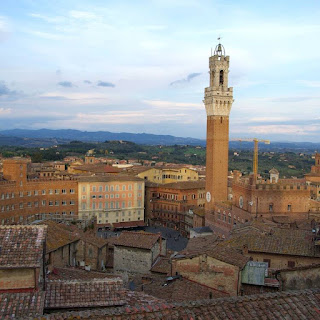Also, although the Noveschi families had been exiled, a prominent Sienese named Enea Silvio Bartolomeo Piccolomini became Pope Pius II, and his influence allowed the nobles to return. The head of the Noveschi was Pandolfo Petrucci, who spent his time gathering political power until finally he was able to set himself up as a tyrant.
As with Gian Galeazzo Visconti, sometimes a strong individual is needed to get a government back on track. (Machiavelli's advice on this came about a decade after Petrucci's coup.) He did lead Siena back to greatness, promoting arts and sciences. Unfortunately, the Petrucci family was power-hungry. Pandolfo was succeeded by his son Borghese, but four years later Borghese was ousted by his cousin Raffaello. Raffaello was a cardinal, and his duties forced him to hand the control his nephew Francesco, who managed a year before Pandolfo's youngest son Fabio ousted him. Fabio was not well-liked, and in 1525 Siena exiled him.
With the Petrucci family gone, Siena saw even more internal strife. Once again the Noveschi were ousted. They were supported by Pope Clement VII, who sent an army to Siena, but it was defeated. Taking advantage of the chaos, Holy Roman Emperor Charles V installed a Spanish garrison about 1529, but Siena got rid of them in 1552 with help from France. Charles sent an army with Florentine help to lay siege to Siena, who endured for 18 months before giving up, surrendering to Spain. Since King Philip II of Spain owed large sums to the Medicis, he gave Siena to Florence. Self-rule was denied them for a long time.
One of the creations of the Republic was the Monte di Pietà or "mount of piety," founded in 1472, where poor people could get loans with manageable interest. It got its funds from charitable donors, and loans would be assured by the borrower handing over possessions as collateral. Yes, it functioned more like a pawnbroker, or an organized charity, but it helped numerous people and inspired similar arrangements all over Europe. This Siena institution never stopped functioning. Today it is called the Banca Monte dei Paschi di Siena, and qualifies as the oldest continuously functioning bank in the world.
Pope Pius II has been mentioned before, once even involving politics, but I'd like to look at him more closely, especially because he has a link to an even more interesting character that you all have heard of, but has not yet been mentioned here. More tomorrow (and, of course, the next day).
